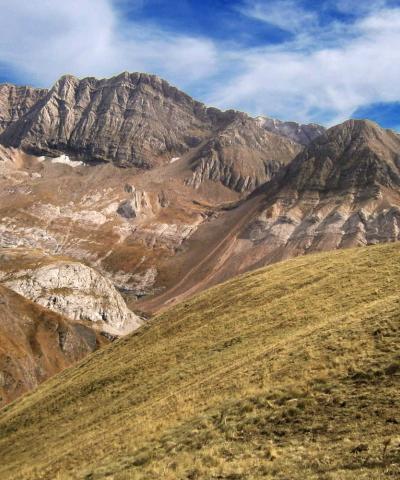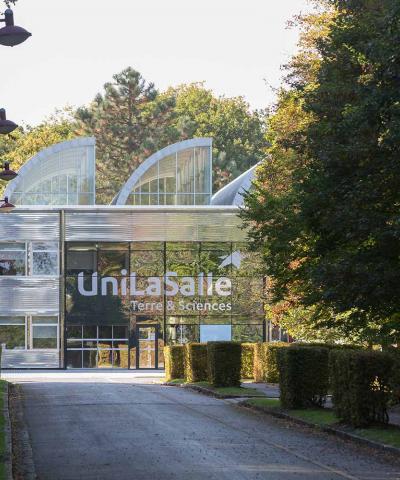A course focused on understanding the subsoil and its risks in order to build sustainable and environmentally friendly infrastructures and to sustainably manage and protect water resources.
The challenges of development
The Planning and Environment pathway leads to two major orientations :
- development and management of natural risks
- the management and protection of water resources.
These two fields are increasingly linked within companies.
The development of our territory and the management of natural risks depend on the demographic evolution and our needs. Through their knowledge of the subsoil and risks, geotechnicians participate in the design of new infrastructures that adapt to the territories in which they are anchored. They also have the task of responding to issues related to climate change by anticipating and assessing the natural risks we face. These engineers work with the natural environment and in interaction with the construction industry, on new structures as well as on old ones. They bring construction projects to life by taking into account the various risks and adapting the solutions applied to each site.
Water management and the clean-up of impacted environments are key elements in the sustainable management of resources in terms of quantity and quality. Given the climate change, the massive use of water in our daily lives, the impacts of agricultural and industrial activities and the fact that groundwater resources are limited, these specialized engineers have a major role to play in the protection and management of these resources. Their role involves observation and evaluation of groundwater dynamics in the field (measurements and sampling) but also numerical modelling of these phenomena to anticipate the evolution of water resources and environmental problems (pollution / depollution).
Details of the courses
Semester 7 - Development, Water, Environment
Planning, Water, Environment Major
The major corresponds to the courses specific to the course. It consists of course sequences and projects.
- Environment and groundwater
- Geomechanics
- Project: Thesis of Initiation to Research 1
Minors
Each semester includes 2 blocks dedicated to minors, corresponding to 54 hours of complementary courses that allow the student to complete his training in a related field.
The proposed minors
Block 1: Automated data processing : Python Programming and Numerical Methods, Python and Advanced Methods / Water Resources, Polluted Sites and Soils / Geotechnical Works / Scientific Approach - Research - Beginner / Innovating, Undertaking and Combating Creatic Attitudes
Block 2 : Advanced Spatial Analysis : Advanced spatial data processing (remote sensing, Python automation, 3D, Data Model, Web diffusion) on ArcGIS / Scientific approach - Research - Beginner / Consolidate your level of English - Validate the required level
Semester 8 - Hydrogeotechnical Characterization and Testing
Characterization and hydrogeotechnical testing major
- Hydrogeophysical reconnaissance - Polluted sites and soils
- Geotechnical reconnaissance
- Project: Thesis of initiation to research 2
Minors
Each semester includes 2 blocks dedicated to minors, corresponding to 54 hours of complementary courses that allow the student to complete his training in a related field.
The proposed minors
Block 1: Logging, hydrogeophysics and drilling diagnostics / Geotechnical works / Introduction to the Web: Developing an Internet site / Sales techniques and commercial relations / Project management: From forecasting to agile / Scientific approach - Research - Intermediate
Block 2: Management field and application in RMD and Hydrogeology / Management field and application in Geoenergy and Geotechnics / 3D Modeling: Design of 3D parts on Dassault System solutions and 3D printing / Immersive entrepreneurship and design thinking / Scientific approach - Research - Intermediate
Semester 8 - Hydrogeotechnical Characterization and Testing
Characterization and hydrogeotechnical testing major
- Hydrogeophysical reconnaissance - Polluted sites and soils
- Geotechnical reconnaissance
- Project: Thesis of initiation to research 2
Minors
Each semester includes 2 blocks dedicated to minors, corresponding to 54 hours of complementary courses that allow the student to complete his training in a related field.
The proposed minors
Block 1: Logging, hydrogeophysics and drilling diagnostics / Geotechnical works / Introduction to the Web: Developing an Internet site / Sales techniques and commercial relations / Project management: From forecasting to agile / Scientific approach - Research - Intermediate
Block 2: Management field and application in RMD and Hydrogeology / Management field and application in Geoenergy and Geotechnics / 3D Modeling: Design of 3D parts on Dassault System solutions and 3D printing / Immersive entrepreneurship and design thinking / Scientific approach - Research - Intermediate
Semester 9 - "A la carte" major
In semester 9, you can choose to follow the path of your choice by selecting one of the following
- one of the two main majors in the Planning and Environment track, which delves deeper into this field (subject to change):
- Hydrogeology and Polluted Sites and Soils
- Geotechnics and Natural Hazards
- one or more opening majors, designed to broaden your skills in another field (subject to change):
- Ecological Engineering (Rennes campus)
- Numerics applied to geosciences (Beauvais campus)
- QHSE, CSR, Risk manager (Beauvais campus)
- Intrapreneurship, entrepreneurship and innovation (Beauvais campus)
- a semester, a double degree or a degree-granting stay in France or abroad (from 12 to 18 months for a double degree or a degree-granting stay)
Semester 10 - End of study internship
The end-of-studies project is based on an internship in a company or a research internship for students, or on the long period in a company for students following an apprenticeship program.
It leads to the writing of a thesis and an oral defense.
What jobs can I do after completing the Planning and Environment program?
The Planning and Environment program allows students to work in design offices, start-ups or companies in the building and public works sector, in project management and contracting, or in public organizations, particularly in the environmental sector, the industrial sector (management of water needs and environmental impacts), mining (post-mining), petroleum (decontamination), or in the construction and public works sector (land and waste management).
Some professions
- Project manager / environmental studies officer
- Environmental engineer
- Project manager or project manager for polluted sites and soils
- Works engineer / site manager in decontamination
- Hydrogeological engineer
- Modeling engineer
- Design engineer
- MOA/MOE support engineer
- Research engineer
- Geophysical engineer
They welcome our engineers
ANTÉA GROUP, BRGM, COLAS ENVIRONNEMENT, GINGER BURGÉAP, GROUPE GÉOTEC, HPC ENVIROTEC, MINISTÈRE DES ARMÉES, ORTEC SOLEO, SOCOTEC, SOLER HYDRO AND SOLER ENVIRONNEMENT, STRATÉGÉO, SUEZ EAU France AND SUEZ RR IWS REMEDIATION, TAUW, VALGO, VÉOLIA, BOUYGUES, CEA, CEREMA, COLAS, EDF, EGIS, ENGIE, FONDASOL, GEOTEC, GINGER-CEBTP, HYDROGEOTECHNIQUE, INERIS, RATP, SIXENSE, SNCF, SOLETANCHE-BACHY, SPIE BATIGNOLES, TECHNOSOL, VINCI


